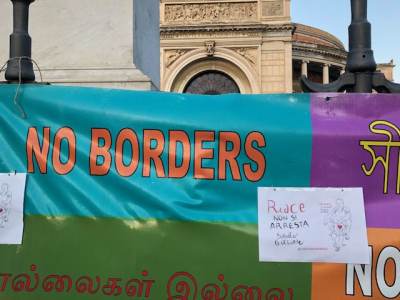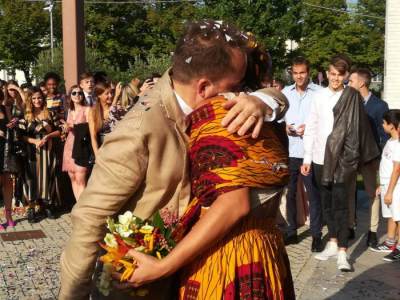The refugee reception centres in the Madonie (Palermo) – part 1
Refugees are left be to themselves
The cooperative Badia Grande manages the protection facilities for asylum seekers and refugees (SPRAR) in Petralia Soprana, Petralia Sottana, Blufi, Polizzi Generosa, Castellana Sicula and Gangi. The municipality Petralia Soprana, in cooperation with other municipalities, has been assigned to administrate 90 seats for the next three years (2014-2016) in the tender. In addition to the cooperative, the project was accompanied by Don Librizzi (Regional Director of Caritas at that time).
If you look more closely in the protection facilities for asylum seekers and refugees, it becomes more and more apparent that asylum seekers are left to themselves, and that there is only one reference person in the centre. This support for asylum seekers is the sporadic presence of the social worker, i.e. usually twice a week. While two social workers are responsible for two centres, two other social workers work together in a reception centre.
Both residents and staff point out the absence of any psychological support. With respect to legal matters, a worrying neglect is prominent. In the centre of Petralia Sottana, a refugee explained that he had to find a lawyer by himself to appeal against the decision of the Territorial Asylum Commission. Six refugees who had received a negative answer from the Commission in Petralia Soprana were all assigned to the same lawyer and none of them has heard from him ever since, that is for one month. A Pakistani is particularly disturbed by the long wait. He told me that his residence permit has expired three or four months ago and that it cannot be extended because he still does not have a document confirming his appeal process. I could not believe it when migrants in Polizzi Generosa also complained that they have to travel at their own expense to Trapani to learn the result of the Commission. However, an employee confirmed the fact. It seems as if the legal information is poor. A resident of the centre in Petralia Sottana complains, “They urged me to sign a contract and told me that I would have my papers in six months. I’m in Italy for over a year now and still have nothing in my hand.” I wonder whether I may have a look into this contract. It is the consent agreement for the semi-annual project of the protection facility for asylum seekers and refugees. It is beyond comprehension that the refugee signed this contract in the conviction that he will have the valid documents within six months. Who knows which misunderstanding has raised those hopes.
Despite all the shortcomings, it cannot be said that there is a lack of professional training opportunities. Three to four people in each protection facility have the opportunity to use the job market, and thus, to get a job with the street cleaning in the various municipalities. Although, all centres are under the same management, and although, all residents have been in Italy for about a year now, it is amazing to see the different atmosphere in the facilities. In some centres, I notice a lot more anxiety than others. The only factor that can explain these differences is the competence of the staff or rather the skills of the person who is responsible for a centre. An employee in the protection facility, led by the cooperative Badia Grande, must take care of the daily tasks of the social worker as well as that of the mediator. This position has also been given to an immigrant, an asylum seeker and a former resident and of the reception centre of Caritas in Trapani. He has been living in Italy for several years and is in possession of a valid residence permit. He lives in the same centre with other asylum seekers and shares a room and bathroom with residents. He also supervises this centre and is on duty 24/7. I ask if he has permission to take off from work. He replies that he can take holidays every now and then, but not very often. When I ask employees about their salary, they laugh and explain, “Today, when so many people are looking for a job and cannot find one, it is already something to have a job at all.”
Furthermore, I am trying to understand the transition from asylum seeker to an employee of Caritas Trapani. An employee summarizes briefly and tells that when arriving in Italy, Don Librizzi has welcomed him with open arms at the harbour. This is how his time with Caritas Trapani started. For those who are not in the picture: on the basis of criminal charges for abuse of authority and sexual violence against migrants, Don Librizzi, former director of Caritas Trapani, has been under house arrest since last summer. The employment contracts of these employees are different: two of them claim to have a permanent contract, one is extended month after month and the others have half-year contracts. The qualification of staff leaves much to be desired. Although they describe themselves as mediators, some of them do not even speak English. Although they try getting by with some Italian and their local language, the communication with the residents of the centres is often simply impossible.
Carlotta Giordano
Published by Borderline Sicilia
Translated by Aylin Satmaz



